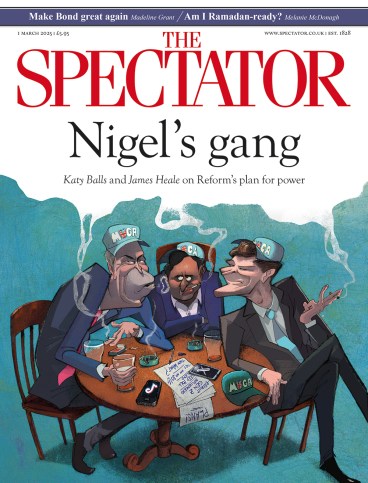
Rules Britannia
Sir: Your rules for national survival in the realist world which we are now entering (‘Get real’, 22 February) make sense. However, they do not go far enough. Rule 1 (enhancing our military lethality) rightly identifies the need for better trained and equipped personnel, but it does not include the need to regain military mass in numbers of troops and battle-winning equipment. A fifth rule, covering the need to make durable alliances with friendly countries – essential for survival in a volatile multipolar world – could also usefully be added.
Regarding Rule 2 (laser focus on the primary purpose of armed force), it may be that the type of anti-DEI policies likely to be introduced in the US military and then mercilessly derided by liberals on both sides of the Atlantic may be more necessary here than we’d care to admit. Sadly, I share your pessimism that our current government will have neither the courage, vision or will to embrace, or even properly consider, any of the rules which you propose.
Group Captain Jeff Green RAF (Retd)
Bath
America first
Sir: I agree with much in your 22 February leading article ‘Promises, promises’. However, it should be pointed out to our transatlantic friends that while Europe was indeed ‘happy to shelter beneath America’s military umbrella’, this umbrella was not provided for altruistic purposes and neither did it come without costs.
The purpose of this American ‘umbrella’ over Europe was to allow America to strike the Soviet Union quickly and pre-emptively, with nuclear force if necessary and with conventional military force if not.
The Americans believed it was better to fight the Soviets in Europe than have nuclear missiles rain down on their own country. The delivery time for their tactical and strategic nuclear missiles would also be far shorter if launched from Europe rather than the USA. The cost to Europe was to become legitimate targets for Soviet nuclear destruction.
In the UK, the American nuclear submarine base at the Holy Loch, Dunoon, and the American Air Force base at Greenham Common with its cruise missiles would have been immediate targets for Soviet destruction, and the death of hundreds of thousands of civilians. The American umbrella was indeed large, but it came at a cost.
Mike Robson
Aberdeen
All Rhodes
Sir: Adding some dimension to Julian Glover’s ‘Letter from Zimbabwe’ (22 February), the Matabele in fact honoured Cecil Rhodes with the royal salute at his World’s View grave site in the Matopos Hills, their spiritual home where only one other, their founding chief Mzilikazi, is also buried in a nearby cave. An impi of 3,000 warriors celebrated and guarded the magnificent ceremony. The leaders promised his brother that it was their sacred trust to protect his spirit and that succeeding generations would too. Rhodes’s vision of the country was a paradise for all its people and his first order of business was a request to the Matabele, who had invaded some 60 years prior, to stop the routine slaughter of the menfolk of the Karanga (Shona) tribe.
J.B. Cowper
Taplow, Bucks
Name game
Sir: Dot Wordsworth’s ‘Notes on…’ (22 February) reminded me how nominative determinism was in action in the UK’s Meat and Livestock Commission (MLC) at the turn of the millennium. Now sadly defunct, this body was established to improve the efficiency of the British meat and livestock industry and promote the sale of red meat produced by British farmers.
In the early 2000s MLC employed a marketing manager called Chris Lamb. David Trotter was responsible for sales development, the pig meat product manager was Mo Herd, and it was all overseen by chairman Don Curry (now Lord Curry of Kirkharle). Then there was the press officer, John Bullock. This was a time when press releases were still sent by post. He once recounted how he’d given up sending a covering letter with them, because he was fed up with recipient journalists penning news briefs about his name, rather than the red-meat stories he had hoped for.
Adrian Bell
Marlborough, Wiltshire
Thou shalt not legislate
Sir: There was a time when many of the Ten Commandments were not only against the law of God but also the criminal law of the land. Now only two-and-a-half are: thou shalt not kill; thou shalt not steal; thou shalt not bear false witness (but only under oath). The vast majority of people in this country welcome that. They can try to follow all of God’s law if they wish, but if they fail they will not be locked up unless they murder, steal or commit perjury.
So Labour’s consideration of a law which would effectively be against blasphemy is a dangerous step backwards (‘The problem with legislating against hurt feelings’, 22 February). What comes next: making adultery a criminal offence (as it used to be), coveting your neighbour’s property, dishonouring your parents?
Of course, a blasphemy law could not deal just with blasphemy against Islam. Under equality legislation, it would need to be against all faiths (and presumably none). The lady who took the name of Our Lord in vain on my train yesterday, while protecting her child from a falling suitcase, would presumably be committing a criminal offence. I was slightly offended, but equally full of sympathy for her. Being a sinner, as we all are, I might well have done the same.
If the argument is that this is about racism, then legislation is already in place. No more is required. But trying to conflate race and religion is dangerous. Our government and parliament should steer well clear.
Jeremy Lefroy
Keele, Staffordshire







Comments